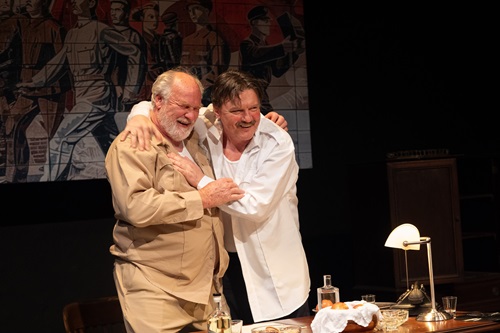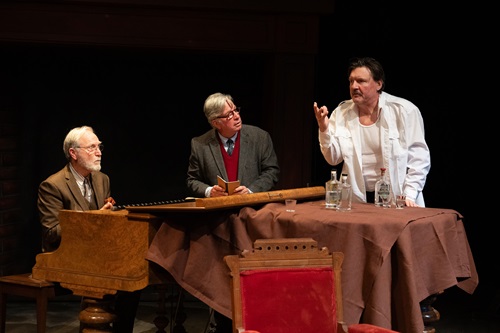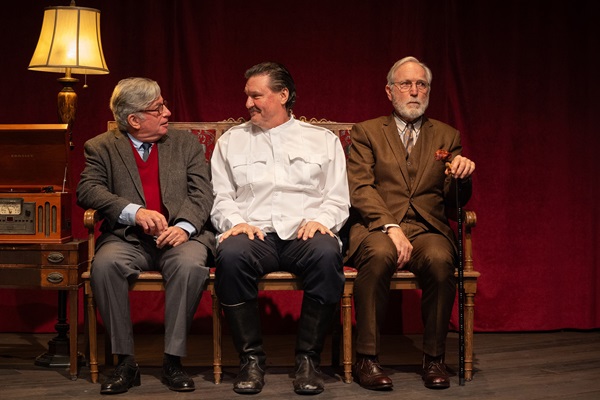Becoming Joseph Stalin, Ukrainian actor Ilia Volok captures the composers and audience with charismatic manipulations that ruffle totalitarianism’s dark and bloody shadows.
By John Lavitt
Los Angeles, CA (The Hollywood Times) 04-26-2024
When 20th-century iconic Russian composers Dmitri Shostakovich and Sergei Prokofiev are summoned to the Kremlin by Soviet cultural minister Andrei Zhdanov in 1948, it is not a good day. When they are summoned to meet there with Russian dictator Joseph Stalin, It quickly descends from a lousy day into downright terror. After all, isn’t this the man who is responsible for the deaths of over twenty million Russian souls before, during, and after the Second World War? Isn’t the “Father of the People” arguably the most dangerous man in the world?
In British playwright David Pownall’s Stalin’s Master Class, such a meeting, which never happened to our knowledge in reality, is the setting of a music-filled dark satire that highlights the totalitarian insanity of the 20th century. Playing Joseph Stalin, Ukrainian actor Ilia Volok brings a devilish humanity to the dictator that is perhaps not deserved. However, watching his manipulations and domination of the other performers on stage is magnetic. Without question, from the moment of his arrival, he is in charge of what’s happening on the stage at the Odyssey Theatre Ensemble in Los Angeles. From beginning to end, as directed by Ron Sossi, the robust production reeks of Stalin’s cult of personality.
As Soviet cultural minister Andrei Zhdanov, John Kayton is a smart but subservient brute to his master. Frustrated by his underling position, he knows that Stalin is one hundred percent in charge of the proceedings. Although he does not see how the dictator will convince the two composers to write Soviet music that supports the needs of the State, he never fails to back his master. Without question, he knows on which side his bread is buttered, and he does not care who falls prey to the rapaciousness of Stalin’s appetite for domination. After all, like everyone else in the Soviet Union, he is one wrong step away from the snow drifts of Siberia.

At its core, the play is about the Zhdanov Doctrine or Zhdanovism, a Soviet cultural doctrine developed by Zhdanov in 1946. The main principle of the Zhdanov Doctrine was often summarized by the phrase, “The only conflict that is possible in Soviet culture is the conflict between good and best.” In other words, what is best for the State is preeminent, and artists must bend their desire for greatness to enhance the mission of the Soviet Union. Thus, hermetic music that emphasized dissonance was rejected in favor of socialist realism.
As Dmitri Shostakovich, Randy Lowell is the intellectual’s intellectual, a bookish creator who clearly wants to be alone in his studio with his piano and pen. Nervous to the core and overwhelmed by the enormity of the moment, Shostakovich is befuddled by Stalin’s demands. Although he wants to be a good comrade, he does not know how to bend his artistic sensibility to brute force. The more the force bends him, the closer the poor man comes to breaking. The Zhdanov Doctrine crushes Shostakovich because, as Wikipedia illuminates, “his music is characterized by sharp contrasts, elements of the grotesque, and ambivalent tonality.”
As Sergei Prokofiev, one of the most brilliant and prolific Russian composers of his generation, Jan Munroe plays a wounded artist fighting to survive troubling times. Limped from an accident and walking with a cane, Prokofiev’s physical limitations reflect his spiritual wounds. As Stalin rants and raves, demanding new Soviet music, Prokofiev often seems sick to his stomach. He shakes his head as he watches Andrei Zhdanov parrot his master, believing that the cultured man knows better in his heart and soul. However, those elements are buried under the ideology of the state and Stalin’s cult of personality.

Discussing the production, Ron Sossi illuminates his goals as a director, saying, “I’ve always been fascinated by the nature of so-called ‘evil people.’ What makes them tick? Do they see themselves as evil, or do they see themselves as doing the right thing? In Master Class, you see a side of Stalin that is very patriotic, a man who wants to renew his country. He wants to get these guys to write music that is more accessible and comforting to the sad survivors of the devastating World War, the children, and the old people.”
Indeed, hidden behind the tyrant’s manipulations and machinations, Stalin’s humanity longs for redemption. As a human being, he hopes to achieve a lasting legacy that will transcend his crimes and wipe the evil from his plate. Such a removal is impossible, and, in the end, we realize that Stalin’s bluster hides a brokenness that will never be healed. When such brokenness is combined with absolute power, will anyone be spared its wrath?
Stalin’s Master Class is featured at the Odyssey Theatre Ensemble through May 26.
Photos by Jenny Graham Courtesy of the Odyssey Theatre Ensemble





